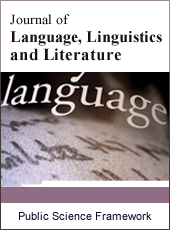Journal of Language, Linguistics and Literature
Articles Information
Journal of Language, Linguistics and Literature, Vol.1, No.3, Jun. 2015, Pub. Date: Apr. 22, 2015
The Effect of Continuous Self-Assessment for Spanish Learners’ Self-Efficacy: Implications on the Foreign Language Classroom
Pages: 55-64 Views: 5743 Downloads: 1337
[01]
Javier Coronado-Aliegro, Department of Modern Languages, Elgin Community College, Elgin, Illinois, USA.
[02]
Robert C. Schwartz, School of Counseling, University of Akron, Akron, Ohio, USA.
Self-efficacy is important to students studying a foreign language, however little empirical research to date has investigated how classroom self-assessment practices enhance students’ self-efficacy. The purpose of this study was to evaluate whether Spanish students engaging in continuous self-assessment exercises resulted in more self-efficacy compared to students not engaging in classroom self-assessment (N=140). A pre-test, post-test control group research design was used to test this comparison. Results of a 2X2 ANOVA and follow-up analyses revealed that Spanish students who engaged in weekly classroom self-assessment exercises showed statistically significantly higher self-efficacy at the end of one semester (i.e., from pre-test to post-test), whereas students who did not engage in these exercises did not show such an increase. Implications for the foreign language classroom are discussed.
Self-Efficacy, Self-Assessment, Spanish, Foreign Language
[01]
Artistico D., Cervone D., Pezzuti L. (2003). Perceived self-efficacy and everyday problem solving among young and older adults. Psychol Aging 18: 68-79.
[02]
Baleghizedeh S., Masoun A. (2013). The effect of self-assessment on EFL learners’ self-efficacy. TESL Canada Journal 31: 42-58.
[03]
Bandura A. (1997). Self-efficacy: The exercise of control. New York: W. H. Freeman/Times Books/ Henry Holt & Co.
[04]
Bandura A. (1994). Regulative function of perceived self-efficacy. Hillsdale, NJ: Lawrence Erlbaum Associates, Inc.
[05]
Bandura A. (1989). Regulation of cognitive processes through perceived self-efficacy. Dev Psychol 25: 729-735.
[06]
Bandura A. (1986). Social foundations of thought and action: A social cognitive theory. Englewood Cliffs, NJ: Prentice-Hall.
[07]
Betz N. E. (2004). Self-efficacy: contributions of self-efficacy theory to career counseling: A personal perspective. Career Development Quarterly 52: 340-353.
[08]
Blanche P. (1990). Using standardized achievement and oral proficiency tests for self-assessment purposes: The DLIFLC study. Language Testing 7: 202-229.
[09]
Blanche P., Merino, B. (1989). Self-assessment of foreign-language skills: Implications for teachers and researchers. Language Learning 39: 313-340.
[10]
Borg W. R., Gall M. D. (1996). Educational research: An introduction (5th ed). New York: Longman.
[11]
Bouffard-Bouchard, T. (1990). Influence of self-efficacy on performance in a cognitive task. J Soc Psychol 130: 353-363.
[12]
Cheng Y. (2002). Factors associated with foreign language writing anxiety. Foreign Language Annals 35: 647-656.
[13]
Clément R., Dornyei Z., Noels K. A. (1994). Motivation, self-confidence, and group cohesion in the foreign language classroom. Language Learning 44: 417-448.
[14]
Coronado-Aliegro J. (2007). Enhancing learner self-efficacy through continuous self-assessment: Implications for the foreign language classroom. In A. J. Moeller (Ed.), 2007 Report of the Central States Conference on the Teaching of Foreign Languages (pp. 127-141). Milwaukee, WI: RMT.
[15]
Creswell J. W. (2003). Research design: Qualitative, quantitative, and mixed methods approaches (2nd ed.). Thousand Oaks, CA: Sage.
[16]
Dodd A. (1995). Engaging students: what I learned along the way. Educational Leadership 53: 65-68.
[17]
Dornyei Z. (1994). Motivation and motivating in the foreign language classroom. Modern Language Journal 78: 273-284.
[18]
Ehrman M. E. (1996). Understanding second language learning difficulties. Thousand Oaks, CA: Sage Publications.
[19]
Harris M., McCann P. (1994). Assessment. London: Heinemann.
[20]
Hsieh P. H. (2008). Why are college foreign language students’ self-efficacy, attitude, and motivation so different? International Education 38: 76–94.
[21]
Lent R. W., Brown S. D., Larkin K. C. (1986). Self-efficacy in the prediction of academic performance and perceived career options. Journal of Counseling Psychology 33: 265-269.
[22]
MacIntyre P. D., Dornyei Z., Clement R., Noels K. A. (1998). Conceptualizing willingness to communicate in an L2: A situational model of L2 confidence and affiliation. The Modern Language Journal 82: 545-562.
[23]
Mertler C. A., Vannatta R. A. (2002). Advanced and multivariate statistical methods. (2nd ed). Los Angeles: Pyrczak Publishing.
[24]
Mills N. A. (2004). Self-efficacy of college intermediate French students: Relation to motivation, achievement, and proficiency. Dissertation Abstracts International Section A: Humanities and Social Sciences, 65 (2-A), 440.
[25]
Mills N., Pajares F., Herron C. (2007). Self-efficacy of college intermediate French students: Relation to achievement and motivation. Language Learning 57: 417–442.
[26]
Moskovsky C., Alraibai F., Paolini S., Ratcheva S. (2013). The effects of teachers’ motivational strategies on learners’ motivation: A controlled investigation of second language learners. Language Learning 63: 34-62.
[27]
Multon, K. D., Brown S. D., Lent R. W. (1991). Relation of self-efficacy beliefs to academic outcomes: A meta-analytic investigation. Journal of Counseling Psychology 38: 30-38.
[28]
National Standards for Foreign Language Learning Retrieved October 26, 2007 from http://www.cal.org/ericcll/faqs/rgos/flstandards.html.
[29]
Oscarson M. (1989). Self-assessment of language proficiency: rationale and applications. Language Testing 6: 1-13.
[30]
Pajares F. (1996). Self-efficacy beliefs in academic settings. Review of Educational Research 66: 543-578.
[31]
Pajares F., Graham, L. (1999). Self-efficacy, motivation constructs, and mathematics performance of entering middle school students. Contemporary Educational Psychology 24: 124-139.
[32]
Pajares F., Schunk, D. H. (2002). Self and self-belief in psychology and education: A historical perspective. Improving academic achievement: Impact of psychological factors on education (pp. 3-21). San Diego, CA: Academic Press.
[33]
Schunk D. H. (1991). Self-efficacy and academic motivation. Educational Psychologist 26: 207-231.
[34]
Whilhite S. (1990). Self-efficacy, locus of control, self-assessment of memory ability, and study activities as predictors of college course achievement. Journal of Educational Psychology 82: 696-700.

ISSN Print: 2381-7054
ISSN Online: 2381-7062
Current Issue:
Vol. 6, Issue 1, March Submit a Manuscript Join Editorial Board Join Reviewer Team
ISSN Online: 2381-7062
Current Issue:
Vol. 6, Issue 1, March Submit a Manuscript Join Editorial Board Join Reviewer Team
| About This Journal |
| All Issues |
| Open Access |
| Indexing |
| Payment Information |
| Author Guidelines |
| Review Process |
| Publication Ethics |
| Editorial Board |
| Peer Reviewers |


